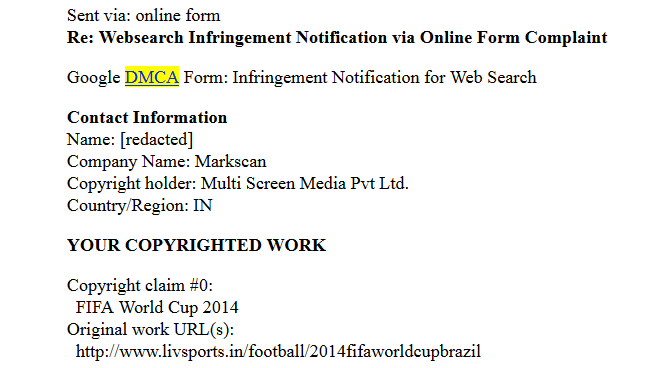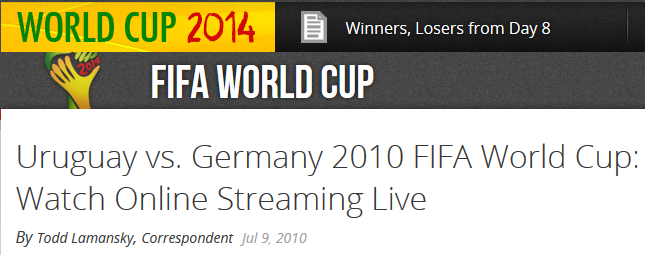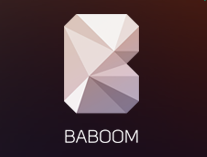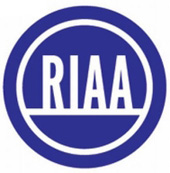Foul!!! Sony Orders Google to Censor The World Cup
dimanche 22 juin 2014 à 11:26 Soccer fever has been spreading across the globe this week, with dozens of millions tuning in to watch the World Cup via regular TV and an abundance of online services.
Soccer fever has been spreading across the globe this week, with dozens of millions tuning in to watch the World Cup via regular TV and an abundance of online services.
While England basked in its somewhat traditional World Cup disappointment Thursday, viewing records were being broken, but amazingly while Brazil sizzles, some want to pour cold water on the excitement.
Allow us to introduce MarkScan, a self-described “consulting boutique dedicated to your IP requirements”. The anti-piracy company is based in India and boasts a wide range of clients including the BBC, HBO, Nokia, and other prestigious brands.
Just recently MarkScan has been doing some work for Multi Screen Media Pvt. Ltd, a Sony Entertainment Television subsidiary in India. In June, Multi Screen Media launched LIV Sports, a digital sports entertainment site that was chosen by FIFA to be the official mobile and Internet broadcaster for the 2014 World Cup.
This week, MarkScan set off on an inevitable DMCA takedown spree to protect its clients’ and FIFA’s rights. What a disaster it’s been.
Much like FIFA, MarkScan began by sending its first batch of copyright complaints to Google several days before a ball had even been kicked. The notice, which covered 46 domains allegedly streaming the World Cup, was 100% rejected by Google.
One of the complaints targeted a great article by GigaOM which helpfully offered “Where to watch the 2014 FIFA World Cup live online, and how to stream it without cable.” The article listed all legal sources, including ESPN, across several countries.
Several subsequent takedown notices targeting more than 700 other URLs saw between 90% and 100% of URLs rejected by Google. One of them was nothing short of a disaster.

 The notice, sent on behalf of Sony’s Liv Sports via Multi Screen Media, targeted 610 URLs, all of which were rejected by Google. All were claimed to be infringing on Liv Sports’ and FIFA’s rights, yet what the notice actually did was target some of the web’s most respectable news sites and resources.
The notice, sent on behalf of Sony’s Liv Sports via Multi Screen Media, targeted 610 URLs, all of which were rejected by Google. All were claimed to be infringing on Liv Sports’ and FIFA’s rights, yet what the notice actually did was target some of the web’s most respectable news sites and resources.
In the article titled “World Cup 2014: How to watch across BBC TV, radio and online”, the BBC attempted to inform its millions of readers how to legitimately access the World Cup. However, as can be seen from the image below, MarkScan had other ideas.

Sadly, this attempted takedown of a purely informational and entirely legal article wasn’t the only casualty of this notice.
An article published by Variety informing its readership that ESPN would be streaming all 64 matches was deemed to be copyright-infringing too, as was a similar attempt by Canada’s CBC.ca.
Other catastrophes would be amusing if they weren’t so awful, such as the attempt to censor this article on Bleacher Report which advised how to watch Uruguay versus Germany – a match from FIFA World Cup 2010 four years ago.

Also targeted was this 2013 article from Hollywood Reporter which detailed plans by Sony (ironically) and FIFA to broadcast the World Cup 2014 in Ultra HD. FoxSports’ interactive World Cup Schedule was also marked as infringing. Both are shown below.

Even legitimate traditional broadcasters couldn’t get the word out unhindered. Communications company Cox wanted to let its residential customers know they could “Watch the World’s Biggest Soccer Games. Any Way You Want” but MarkScan told Google the page was illegal.
The whole notice, which can be read here, has many more examples than those listed above, including the attempted censorship of EA Sports’ Twitter account and FIFA’s very own site – for FIFA Futsal World Cup Thailand 2012. Brilliant.
But, in its own unique way, one takedown is more disappointing than most.
In a post dated June 9, before the World Cup had even begun, Symantec tried to inform its readers on how to avoid various World Cup related scams. We don’t need to tell you what happened to it.
TorrentFreak contacted MarkScan whose Internet Enforcement Team told us they take care to avoid mistakes.
“We want to assure you that we deploy technology, in addition to best efforts of our teams, to ensure that we do not impact legal content on yours, or any other website,” they explained.
We suspect someone could be seeing at least a yellow card, possibly worse, in the days to come.
Source: TorrentFreak, for the latest info on copyright, file-sharing and anonymous VPN services.





